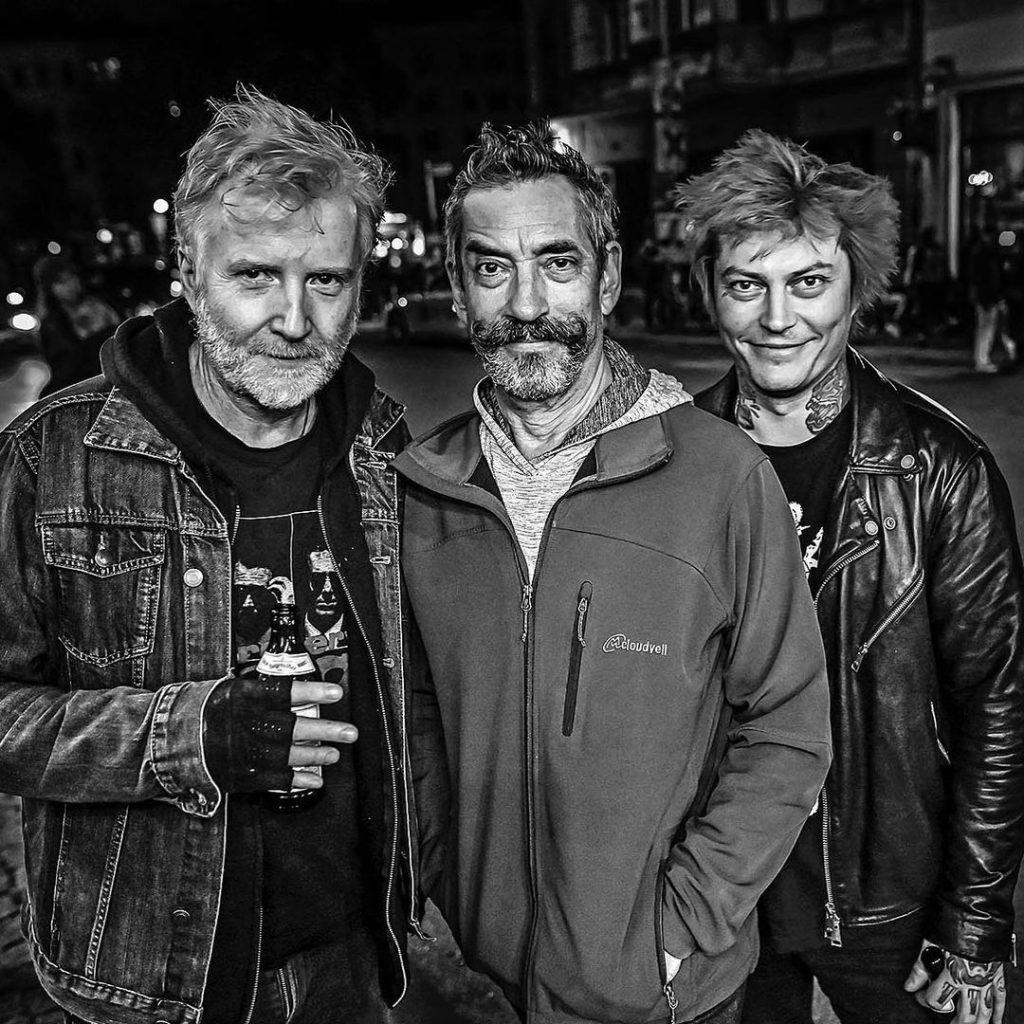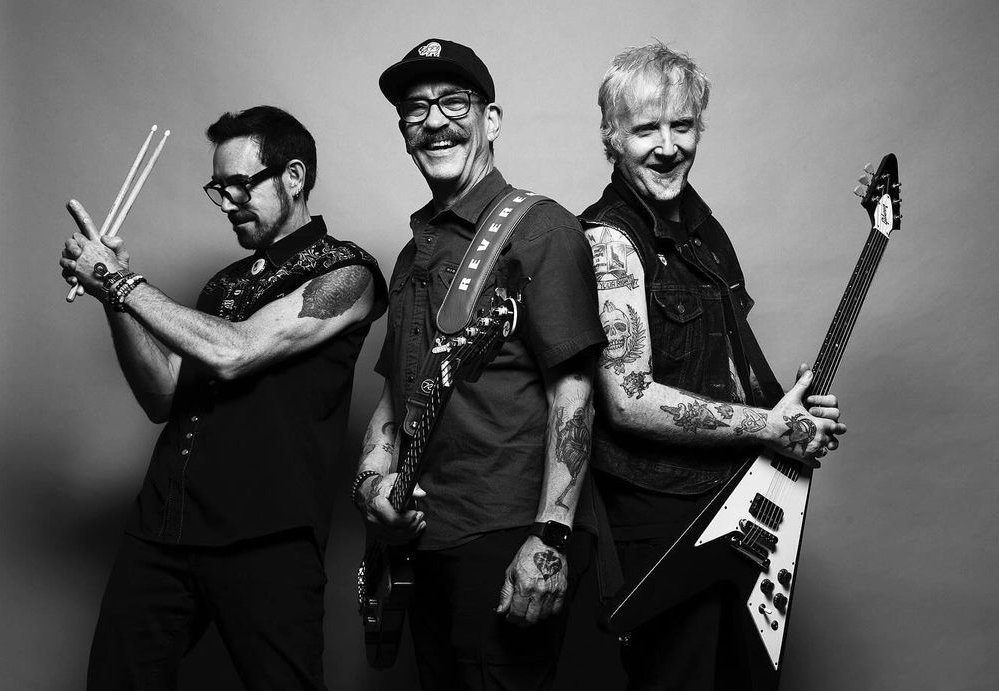From 1979 to 1987, Greg Norton enjoyed success as the bassist of the Minnesota post-hardcore trio Hüsker Dü. At one point, Hüsker Dü was the highest-selling act on SST Records, with their labelmates during their tenure including Black Flag, Minutemen, Saccharine Trust, and Meat Puppets.
In 1985, the band signed to Warner Bros. Records, and became the first independent punk band to sign with a major. After releasing two records with Warner (Candy Apple Grey in 1986 and Warehouse: Songs and Stories in 1987), the band unceremoniously split, due to turmoil between the band’s guitarist Bob Mould and drummer Grant Hart.
While Bob and Grant went on to have successful solo careers and work on new projects (like the aggressive, alt-rock band Sugar, in Bob’s case, and the artsy indie project Nova Mob, in Grant’s), Greg instead took time to explore a different interest: culinary arts.
“I wandered back into the restaurant world and I met a really good friend, who was a very talented chef, and he kind of took me under his wing and mentored me, and I became a chef, myself, and had a fifteen-year career, doing that,” recounts Greg when talking to Post-Burnout, back in June.
The high demands and long hours of working in a restaurant gave Greg little time to engage with the new scenes of that era. “All of that time I spent in the restaurant business, I was in that vacuum and I really didn’t get exposed to a lot of music,” he says.
“Pretty much, if something happened, or was popular, or was big in the ‘90s, most likely I missed it. A lot of the bands that blew up in the ‘90s were bands that I didn’t really know, and, later on, had to get to know.”
In the mid-2000s, after a fourteen-year sabbatical from the bass, Greg began casually playing music again (or, in his words, was “coaxed out of retirement”). In 2016, he joined the (at that point) decade-old Wisconsin alternative rock band Porcupine, replacing their bassist. “That was really good for me, to get my rock chops back up and running,” Greg says.
After recording an album with Porcupine, Greg left as they continued. Around this time, the Canadian Celtic punk band, The Mahones, uploaded a video of them performing a cover of Hüsker Dü’s first radio hit, “Makes No Sense At All,” to Facebook. The video ended up on Greg’s feed, who proceeded to “Like” it (despite noticing some mistakes on their bassist’s part).
After seeing the notification from Greg, The Mahones’ frontman, Finny McConnell, shot him a message, informing him that he had some studio time booked in Berlin, Germany with former U.K. Subs drummer, Jamie Oliver, and then inquiring if he would be interested in playing with them.
While Greg admits to having not heard of The Mahones before seeing their Facebook video, he agreed. “I just decided, ‘I’ve never met these guys. I should, maybe, go and meet them and see if there’s actually anything real, here’,” Greg says.
“[Laughs] And we wrote ten songs in two days, and put the lyrics to it in the next two days. So, Time to Burn was amazing. It felt like we had been playing, forever. It was so easy for us to record the music, and we felt that we had recorded a punk rock classic.”

Photo by Joite
Courtesy of Earshot Media
The aforementioned Time to Burn would become the three’s debut record together. They dubbed this new project UltraBomb, with the joke being that if they blew up and became successful they would be the ultra bomb, but if they blew their shows and sucked, they would still be the ultra bomb. “I’m sure, for certain listeners, that name applies, either way!” jokes Greg.
In Hüsker Dü, Bob and Grant had a competitive songwriting streak, with each trying to outdo the other, which grew in intensity once they began releasing singles. As such, beyond instrumentations, songwriting in Hüsker Dü was rarely collaborative and favoured individually-crafted songs with lead vocal duties for each track being given to its songwriter. Greg’s solo-penned material was sparse in Hüsker Dü, but, in UltraBomb, he became the primary lyrical writer.
“I was really blown away by how well Finny was able to take my lyrics and intertwine and layer them to the music that we created,” Greg says of the band’s songwriting process.
“So, Finny comes up with guitar riffs, and then we, as a band, we’ll take a riff and we’ll make a song out of them. We’ll write the arrangement – ‘Where’s the chorus? Where’s the bridge? Does it need anything?’ – and, once we’re satisfied with that, and after the basic song has already been completed, is when the lyrics get matched up to it.
“Finny matched up all of the lyrics on the first record on his own. I, basically, picked the lyrics on [their follow-up] Dying to Smile and handed them to Finny, and he would go and sing ‘em. It works really well. When I’m writing lyrics, oftentimes, I might have a melody in my head, but it’s nothing like it ends up being paired with, and it just ends up really great.
“Hüsker Dü was kind of a situation where you had to have a song ready to go, to show the band, and it was like if you wrote it, you sing it. Bob and Grant are two amazing songwriters, and, so, it was kind of tough in that world to, number one, feel like I had something that was good enough to match up with their intensity.
“And there was also a feeling of when I did bring things into a rehearsal, to try to introduce something that I had written, that they, maybe, weren’t taking it as seriously as they took their own stuff. So, that was difficult, and that was mentally hard to try and match their intensity. But, with UltraBomb, it doesn’t feel like that, at all; the music has been so easy, and Finny and I, I hope, will continue to create and write fantastic punk songs for a long, long time.”
The band’s latest album, Dying to Smile, which was released in June, was recorded at the end of a UK tour and had a similarly quick turnover as its predecessor. “We recorded Dying to Smile in London in December [2023], and, again, we knocked this one out in another four days,” Greg says. “We wrote twelve songs [on] the first two days and actually ended up with fourteen tracks that we recorded. This band is something special.”
Despite the logistical issues of the three band members living in three different countries (the U.S. for Greg, Canada for Finny, and the UK for Jamie) with three different time zones, this has not hampered their momentum. “UltraBomb, we’re in a position right now where we want to get out and tour, as much as we can, get back into the studio to record the next record, [and] continue to tour,” says Greg.
“We’re committed and dedicated to seeing how far we can go with UltraBomb, and UltraBomb’s blowing up. The reviews are great. The live reviews are great. And it’s a band that we’re all super comfortable, playing together. We’re having so much fun playing and recording, that…well, the cliché’s ‘The sky’s the limit.’”
UltraBomb’s latest record, Dying to Smile, is out now on all streaming platforms. You can purchase a physical copy here. You can find UltraBomb’s music, tour dates and social media accounts here.
Check out our full interview with Greg where we go into further depth about everything discussed in this article, as well as discussing the fast lifestyle of Hüsker Dü and whether it was sustainable, the rumours that the band drank meth-ladened coffee to stay awake while recording Zen Arcade, the Minnesota music scene and how it has changed since Greg stepped away from music, the resurgence of vinyl records, working with DC-Jam Records, what inspires Greg’s lyrics, and much more.

Aaron Kavanagh is the Founder and Editor-in-Chief of Post-Burnout. His writing can also be found in the Irish Daily Star, Buzz.ie, Totally Dublin, The GOO, Headstuff, New Noise Magazine, XS Noize, DSCVRD and more.

 POST-BURNOUT
POST-BURNOUT